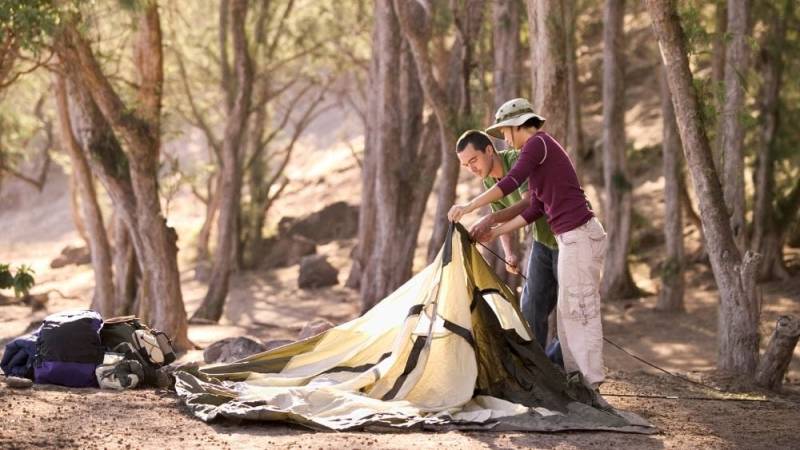
tent poles
Nomen
Meaning
Tent poles are essential components of a camping tent, used to provide structure and support to the tent fabric. They are typically made of lightweight materials such as aluminum or fiberglass, making them easy to carry and assemble. Tent poles are designed to be inserted into the corresponding sleeves or grommets of the tent, creating a sturdy framework that allows the tent to stand upright. These poles are adjustable, allowing you to customize the height and tension of your tent. They play a crucial role in ensuring the stability and functionality of your shelter in the wilderness.

Examples
„I love going camping in the wilderness, and having sturdy tent poles is essential for setting up a reliable shelter.“
„During our last camping trip, we had a strong windstorm, but thanks to the durable tent poles, our tent remained standing.“
„When I go backpacking, I always make sure to pack lightweight tent poles to minimize the weight of my gear.“
„My friend and I were discussing our camping gear, and he recommended investing in high-quality tent poles for added stability and durability.“
„After a long day of hiking, I was relieved to find that the tent poles were easy to assemble, allowing me to quickly set up my tent and rest for the night.“
Origin
The word "tent poles" originates from the English language. It is a compound noun formed by combining the words "tent" and "poles".
The word "tent" comes from the Latin word "tendere", which means "to stretch". It first appeared in the English language in the 14th century and referred to a portable shelter made of fabric or skins stretched over a framework of poles.
The word "poles" is derived from the Old English word "pāl", which means "stake" or "pole". It has been used to refer to long, slender pieces of wood or metal since the 14th century.
Over time, the term "tent poles" has become commonly used to describe the vertical supports or framework that hold up a tent. These poles are typically made of lightweight materials such as aluminum or fiberglass and are essential for maintaining the structure and stability of the tent.
Synonyms
Tent pegs, Tent stakes, Tent poles, Tent supports, Tent frames, Tent rods, Tent spars, Tent uprights
Antonyms
Tent poles: collapsible, Flexible, Lightweight, Portable, Adjustable, Telescopic, Compact, Foldable
Relatives
Tent, Camping, Shelter, Outdoor, Camping gear, Camping equipment, Camping supplies, Camping accessories
Historical and cultural importance
Tent poles have a long history of cultural and practical significance. Throughout the ages, tents have been used by various civilizations for shelter, protection, and as a symbol of nomadic lifestyles. The use of tent poles can be traced back to ancient times, where they were made from natural materials such as wood or bamboo.
In many indigenous cultures, tents and their accompanying poles played a vital role in daily life. They were used by nomadic tribes for shelter during their travels, providing a portable and easily assembled structure. The design and construction of tent poles varied depending on the region and available resources, showcasing the ingenuity and adaptability of different cultures.
During historical military campaigns, tent poles were essential for setting up temporary camps and providing shelter for soldiers. They were often made from durable materials like iron or steel, ensuring stability and longevity in harsh conditions. The use of tent poles in military operations allowed for quick and efficient setup, enabling armies to establish a base of operations wherever they went.
In modern times, tent poles have evolved to incorporate lightweight and durable materials such as aluminum or fiberglass. This innovation has made camping and outdoor adventures more accessible to a wider range of people. Tent poles are now an integral part of camping equipment, providing the necessary support and structure for tents of various sizes and designs.
Whether you're a seasoned camper or an outdoor enthusiast, understanding the historical and cultural significance of tent poles adds depth to your appreciation of this essential piece of equipment. It connects you to the rich heritage of human ingenuity and resourcefulness in adapting to the natural world.
More information about the term tent poles
Tent Poles: Essential Gear for Outdoor Shelter
When it comes to outdoor adventures and camping, having a reliable and sturdy shelter is crucial. One of the key components of any tent is the tent poles. These simple yet essential pieces of gear play a vital role in providing structure and stability to your temporary home in the wilderness.
The Purpose of Tent Poles
Tent poles serve as the framework for your tent, supporting the fabric and creating the shape and structure. They are responsible for keeping the tent upright, ensuring it can withstand various weather conditions, including wind, rain, and even snow. Without tent poles, your tent would simply collapse, leaving you exposed to the elements.
Most tent poles are made from lightweight materials such as aluminum or fiberglass. This makes them easy to carry and set up, without adding unnecessary weight to your backpack. They are designed to be durable and flexible, able to withstand the rigors of outdoor use.
Types of Tent Poles
There are several types of tent poles available, each with its own advantages and disadvantages:
1. Traditional Poles: These are the most common type of tent poles and are usually made of aluminum or fiberglass. They consist of several sections that can be connected together to create the desired length. Traditional poles are versatile and can be used with a variety of tent designs.
2. Shock-Corded Poles: These poles have an elastic shock cord running through the sections, allowing them to quickly snap together during setup. This feature makes them convenient and time-saving, especially when setting up your tent in challenging weather conditions.
3. Folding Poles: Folding poles are designed to collapse into shorter lengths, making them easier to pack and transport. They are commonly used in lightweight backpacking tents and are ideal for those who prioritize portability.
Tent Pole Care and Maintenance
To ensure the longevity and reliability of your tent poles, it's important to take proper care of them:
1. Clean and Dry: After each camping trip, make sure to clean your tent poles and allow them to dry thoroughly before storing them. This helps prevent corrosion and damage caused by moisture.
2. Avoid Overexertion: While tent poles are designed to be durable, avoid putting excessive pressure or force on them during setup or takedown. This can lead to bending or breaking, compromising their functionality.
3. Check for Damage: Regularly inspect your tent poles for any signs of wear, such as cracks, dents, or bent sections. Replace any damaged poles to ensure the structural integrity of your tent.
Conclusion
Tent poles are an essential piece of gear for any outdoor enthusiast. They provide the necessary support and stability for your tent, ensuring a comfortable and safe shelter in the wilderness. By understanding the different types of tent poles and properly caring for them, you can enjoy many memorable camping experiences with confidence.
Back to overview

